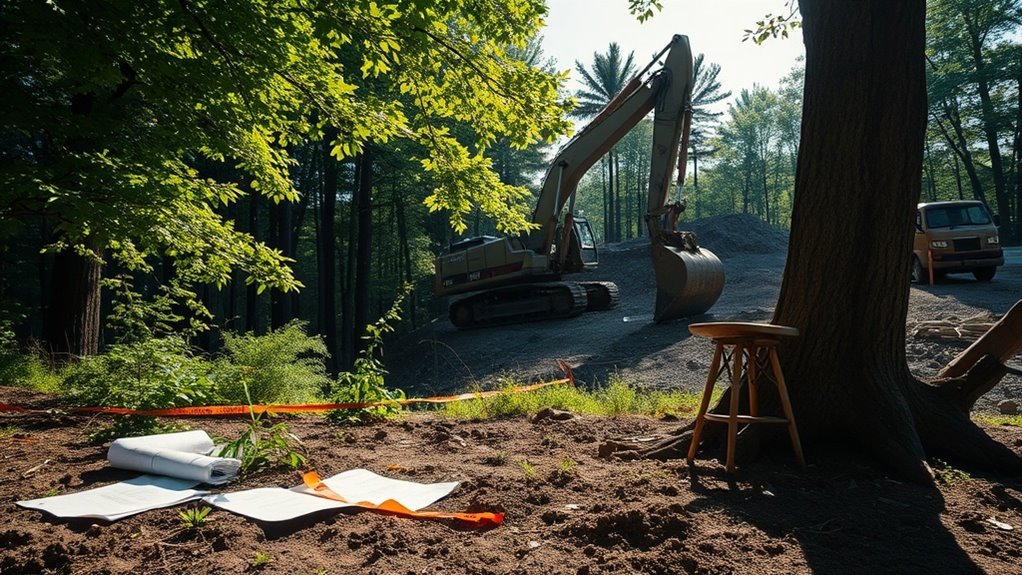Common FEMA Violations and How to Avoid Them
Common violations under Indian regulations include inaccurate project scope, missed deadlines, and inadequate documentation. To avoid these issues, ensure precise project specifications and maintain organized records. Effective communication with regulatory representatives is essential—be clear and respectful in all interactions. Don’t overlook environmental assessments or procurement compliance, as these can result in legal repercussions. Additionally, maintain comprehensive insurance coverage as required by law. Regularly track and monitor your project’s progress to ensure adherence to regulations. Further insights on managing these challenges will be provided.
Key Takeaways
- Ensure clear communication with relevant Indian authorities to avoid misunderstandings regarding project needs and requirements.
- Maintain a detailed and organized documentation process to support compliance with Indian regulations and facilitate audits throughout the project lifecycle.
- Adhere strictly to project deadlines established by regulatory bodies to prevent delays in approvals and avoid potential penalties related to non-compliance.
- Conduct thorough environmental reviews to meet the requirements of the Environment Protection Act, 1986, and avoid legal repercussions or project delays.
- Familiarize your team with public procurement regulations, such as the General Financial Rules and the Public Procurement Policy, to ensure transparency and mitigate compliance issues during government-funded projects.
Inaccurate Project Scope and Cost Estimates

One of the most common violations under Indian legal frameworks arises from inaccurate project scope and resource assessments. When project managers fail to accurately gauge the resources needed for their initiatives, it can lead to significant complications in compliance and execution.
A lack of clarity in project scope increases the likelihood of encountering unexpected challenges that can compromise the project’s adherence to regulatory requirements. It’s crucial to gather precise data and seek the insights of subject matter experts to establish a comprehensive understanding of the project.
Moreover, involving stakeholders from the outset can provide essential perspectives that help clarify project requirements and objectives. Taking the time to formulate thorough and accurate assessments won’t only enhance the quality of the proposal but also mitigate the risk of facing legal repercussions or operational delays during project execution. Additionally, being aware of available government benefits can further aid in proper project planning and execution.
Failure to Meet Deadlines
When project timelines are not adhered to, it can lead to significant repercussions, particularly concerning compliance and regulations under Indian laws. Failing to meet deadlines may result in procedural delays, punitive measures, or even jeopardize project approvals. To mitigate these risks, it is essential to implement efficient project management practices and set feasible timelines. Additionally, missing deadlines can lead to financial fines and damage to a company’s reputation, making compliance critical.
| Possible Consequences | How to Avoid Them |
|---|---|
| Delayed project approvals | Establish strict timelines |
| Project penalties | Regularly track progress |
| Compliance issues | Maintain clear communication with regulatory bodies |
Stay proactive in your planning efforts. Utilize project management tools to oversee tasks and timelines, ensuring adherence to deadlines. It is crucial to keep all stakeholders updated throughout the project’s duration to minimize potential setbacks and enhance overall compliance with applicable regulations.
Inadequate Documentation and Recordkeeping

Inadequate documentation and recordkeeping can lead to serious complications in your project, particularly concerning compliance with Indian laws and regulations.
Inadequate documentation can severely hinder your project’s compliance with Indian laws, leading to complications and potential loss of benefits.
Without proper records, you may find it challenging to demonstrate eligibility for various government programs and showcase the appropriate use of funds. This could result in delays or even loss of benefits.
It’s essential to maintain organized and accurate records from the outset to ensure that you can easily verify expenses and project details.
Utilize digital tools or applications to track documentation, which will simplify access when required. Regularly review your records to ensure their completeness and accuracy.
Furthermore, store all relevant paperwork in a secure location to protect it in the event of audits or inquiries.
Adhering to these practices will help you maintain compliance with Indian regulations and avoid potential legal complications. Additionally, ensure that you are aware of the regulatory framework governing FDI, as this knowledge will further guide your documentation efforts.
Miscommunication With FEMA Representatives
Miscommunication with government representatives can significantly impede your recovery process after a disaster.
To mitigate this risk, it’s essential to employ effective communication strategies and keep detailed records of all your interactions.
Clear Communication Strategies
Effective communication with government officials and representatives of disaster management agencies in India is crucial for successfully navigating the complex processes of disaster assistance.
To enhance clarity, ensure that you articulate your needs and concerns in a concise manner. Avoid using legal jargon or overly technical terms; instead, use simple language that accurately conveys your situation.
Whether communicating via phone or in person, maintain a calm and respectful tone, even in frustrating circumstances. If any information is unclear, don’t hesitate to seek clarification.
It can also be beneficial to summarize the key points of the conversation to confirm mutual understanding. Staying organized and prepared can lead to smoother interactions, so gather all necessary documents and information prior to your discussions.
Clear communication can help prevent misunderstandings and keep your application process on track within the framework of Indian laws and regulations.
Document All Interactions
While navigating the complexities of FEMA (Foreign Exchange Management Act) applications in India, it’s essential to document all interactions with agency representatives. This practice not only safeguards your interests but also ensures accuracy throughout the application process.
Take detailed notes during phone calls, including the names of representatives, dates, and critical points discussed. If you receive any written communication, such as emails or letters, make sure to save those for your records.
Miscommunication can lead to delays or complications in your applications, so having a clear and organized record can help clarify any misunderstandings. In case of any disagreements or confusion regarding your application, refer back to your documented interactions when addressing the issue.
Keeping thorough records can help make your experience smoother and more efficient, ultimately giving you a better chance of achieving a favorable outcome under Indian regulations governing foreign exchange management.
Ignoring Environmental Review Requirements

When you overlook environmental review requirements under Indian laws and regulations, you might face serious consequences.
The environmental assessment process, as mandated by the Environmental Protection Act, is crucial for compliance with various statutory standards.
Ignoring these requirements can lead to legal actions or project delays that significantly affect your initiatives and overall approval from regulatory bodies.
Environmental Assessment Process
Neglecting the environmental review requirements during the Environmental Assessment Process can lead to significant compliance issues for applicants in India. Bypassing these essential steps risks adversely affecting the environment and the well-being of local communities.
It’s crucial to assess potential environmental impacts prior to proceeding with your project. Failing to conduct comprehensive evaluations may result in delays, loss of project approval, or even legal consequences.
Familiarizing yourself with the Environmental Protection Act, 1986, and its associated regulations is essential for compliance. Engaging diligently in the Environmental Assessment Process ensures that your project aligns with statutory requirements.
Required Documentation Compliance
Ensuring that all required documentation is submitted can be a daunting task, especially if you overlook the necessity of conducting an environmental review as per Indian regulations. You might think that skipping this essential step will expedite the process, but it could lead to significant complications in the future.
The environmental review is crucial for assessing how your project will impact the environment and for obtaining the necessary approvals from regulatory authorities.
Be sure to collect all relevant data, such as project descriptions, site maps, and assessments related to historical and archaeological significance, in line with the provisions of the Environment Protection Act and other applicable regulations.
Neglecting to include this documentation can result in delays to your project and create compliance issues with state and central regulations.
Thoroughly verify that you’ve included all required documentation in your application. By doing this, you’ll help ensure that your project progresses smoothly and complies with Indian laws and regulations, avoiding unnecessary obstacles along the way.
Potential Penalties Overview
Failing to conduct the necessary environmental review in accordance with Indian laws can lead to significant penalties that may jeopardize your project. Ignoring these requirements could result in the suspension or rejection of project approvals, severely affecting your plans.
Moreover, non-compliance with environmental regulations might expose you to legal actions, complicating the completion of your project. It’s crucial to recognize that the consequences of non-compliance extend beyond immediate penalties; they can also tarnish your reputation and impact your ability to secure future funding or support from government agencies.
To avoid these issues, it’s essential to prioritize compliance with environmental review requirements from the outset, ensuring the smooth progression of your project while adhering to Indian environmental laws and regulations.
Noncompliance With Federal Procurement Standards
When you overlook Indian procurement laws and regulations, it can lead to significant compliance issues for your organization. These laws are designed to ensure transparency, competition, and fairness in procurement processes.
Failure to adhere to them can result in various penalties and operational hurdles.
To avoid such pitfalls, it’s essential to familiarize yourself with the Indian guidelines on public procurement. Ensure that all purchases are properly documented, competitive bids are solicited, and selection criteria are clearly defined.
Additionally, it’s important to train your team on these regulations and regularly review your procurement practices. Vigilant compliance monitoring will help you maintain eligibility for government projects and protect your organization from unnecessary complications.
Following these guidelines fosters transparency and builds trust with stakeholders.
Lack of Insurance Coverage
While you may believe your organization is adequately covered, the lack of comprehensive insurance can have severe implications during a disaster or unforeseen event. Under Indian laws, government aid—such as through the National Disaster Response Fund (NDRF)—heavily depends on your insurance arrangements. If your organization is underinsured, essential expenses may not be covered, potentially forcing you to shoulder losses that could destabilize your operations.
It is crucial to regularly assess your insurance policies to ensure they align with your current operational needs. Factors to consider include the value of your assets, specific operational risks, and potential liabilities under Indian regulations. Understanding the implications of Overseas Direct Investment is also essential when evaluating comprehensive coverage for international business expansions.
Consulting with an experienced insurance agent can help you identify any gaps in your coverage. By taking proactive measures now, you can prevent significant setbacks later, ensuring you’re adequately protected when calamity strikes. Emphasizing comprehensive insurance isn’t only prudent—it also aligns with government guidelines to facilitate disaster recovery.
Use of Ineligible Expenses
While it may seem tempting to allocate funds freely during a crisis, using ineligible expenses can result in disqualification from assistance programs in India.
It’s crucial to understand what qualifies as an eligible expense before making any financial commitments. Programs like the Pradhan Mantri Awas Yojana and other disaster relief initiatives typically cover costs closely associated with disaster recovery, including temporary housing, home repairs, and medical expenses. However, expenditures on luxury items, routine maintenance of property, or debts aren’t eligible for support.
Prior to submitting any applications for assistance, it’s important to meticulously review your expenditures to ensure they comply with the relevant guidelines. Failure to comply with FEMA regulations can lead to significant legal and financial repercussions. Including ineligible expenses could jeopardize your entire claim. Always keep thorough documentation and receipts to validate your expenses, and refer to official resources from the Government of India for updated information to avoid any misunderstandings or mistakes.
Failure to Track and Monitor Progress
Failing to track and monitor progress can hinder disaster recovery efforts significantly within the framework of Indian laws and regulations. It is crucial to maintain organization and awareness regarding the recovery status to ensure compliance with legal obligations and accountability standards. Without appropriate oversight, one may not only jeopardize funding but also prolong the recovery and rebuilding processes for the affected community.
| Consequences | Actions to Take |
|---|---|
| Delayed Recovery | Regularly update project timelines to meet compliance requirements |
| Legal Liabilities | Implement thorough documentation practices to track progress |
| Risk of Government Scrutiny | Establish transparent communication with stakeholders and regulatory bodies |
Questions
What Assistance Does FEMA Provide for Overcoming Common Violations?
FEMA provides assistance through training, resources, and guidance to help you correct violations according to Indian laws and regulations. They often offer technical support and expertise for projects ensuring compliance, allowing you to restore eligibility for disaster recovery programs.
How Can I Appeal a FEMA Decision on Violations?
If you disagree with a decision made by a governmental authority under Indian law, you have the right to appeal by submitting a written request. Consider this akin to contesting a decision made by an umpire during a cricket match; it’s essential to provide substantial evidence and a clear rationale to bolster your chances of success.
What Training Resources Are Available for FEMA Compliance?
You can access various training resources through the official websites of Indian regulatory bodies, including online courses, webinars, and workshops. These resources assist you in understanding compliance requirements and enhancing your knowledge of managing Indian laws and regulations effectively.
Can I Seek Legal Advice Regarding FEMA Regulations?
Sure, seeking legal advice about Indian laws and regulations is a prudent decision, much like navigating through a dense forest. An experienced attorney can provide valuable guidance on various legal complexities, ensuring that you comply with the necessary legal requirements. Don’t hesitate to reach out for assistance!
Are There Any Tools to Help Manage FEMA Project Compliance?
Yes, there are several tools to help you manage compliance with Indian laws and regulations related to projects. Consider using software solutions designed for grant management, as well as checklists and templates to streamline your processes and maintain organization. These resources can assist in ensuring that your projects adhere to the relevant legal requirements and standards.







